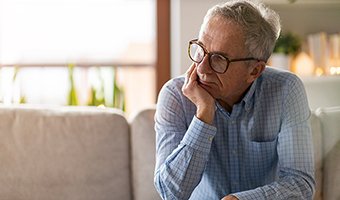Depression associated with loneliness and isolation should not go untreated
 Social isolation and loneliness during the COVID-19 pandemic can lead to depression, and depression can have detrimental effects on overall health, particularly for older adults. ProHealth Care physicians and other health care professionals are helping to address this issue.
Social isolation and loneliness during the COVID-19 pandemic can lead to depression, and depression can have detrimental effects on overall health, particularly for older adults. ProHealth Care physicians and other health care professionals are helping to address this issue.
“People who really miss being around others and who may not have outlets or adequate support systems can become lonely,” said Michael Raster, MD, ProHealth Medical Group psychiatrist and medical director for ProHealth’s behavioral medicine program. “They can become depressed, and clinical depression can cause physiological changes in the body.”
Depression can cause sleep disorders, fatigue and other physical symptoms that can worsen chronic conditions including diabetes, high blood pressure and heart disease.
Routine health screenings of all ProHealth primary care patients are designed to identify symptoms of depression and connect patients with primary care services or behavioral health providers for treatment. Loneliness may naturally come up during such health screenings.
A new report compiled by the National Academies of Sciences, Engineering and Medicine before the pandemic found that more than a third of adults 45 and older feel lonely, and nearly a fourth of adults 65 and older are considered to be socially isolated.
The U.S. Centers for Disease Control and Prevention has also reported that:
- Social isolation significantly increases a person’s risk of premature death from all causes.
- Social isolation is associated with about a 50% increased risk of dementia.
- Poor social relationships are associated with a 29% increased risk of heart disease and a 32% increased risk of stroke.
- Loneliness is associated with higher rates of depression, anxiety and suicide.
- Loneliness among heart failure patients is associated with a nearly four times increased risk of death, 68% increased risk of hospitalization, and 57% increased risk of emergency department visits.
“When clinical depression develops, people may not be able to follow through with medical recommendations," Dr. Raster said. “Social determinants of health — access to things such as jobs, transportation, economic and social opportunities — also factor into depression and loneliness, which can be hard to reverse through medical care alone.”
People with symptoms of depression can often be treated by their primary care physician. Patients who have been diagnosed with dementia, which commonly includes depression, loneliness and social isolation, have access to a ProHealth Care memory loss program that includes home visits and follow-up services to coordinate care across the health care system.
“ProHealth highly recommends that anyone feeling lonely, isolated or depressed let others know how they feel, contact their doctor, and learn about community resources that can help,” Dr. Raster said. “Family members can also encourage older adults to connect with health care services and other resources.”
To find a doctor, visit ProHealthCare.org/Doctor. For information about behavioral and mental health, visit ProHealthCare.org/Behavioral-Health.
Additional resources:
Anyone can dial 211 to connect with local crisis intervention services 24 hours a day, including holidays.
The CDC provides online resources for people with symptoms of depression such as feelings of hopelessness, helplessness and restlessness, at “Depression is Not a Normal Part of Growing Older.”
Local community resources can also help address issues associated with loneliness, isolation and the social determinants of health. Local agencies that serve seniors include:
- NAMI Waukesha, which provides crisis service and counseling phone numbers, information and resources for individuals and families living with mental health issues.
- ADRC, the Aging and Disability Resource Center of Waukesha County, which provides information, assistance, counseling and supportive services, including home-delivered meals.
- Eras Senior Network, which lists multiple services for seniors and helps connect volunteers with seniors who need services.